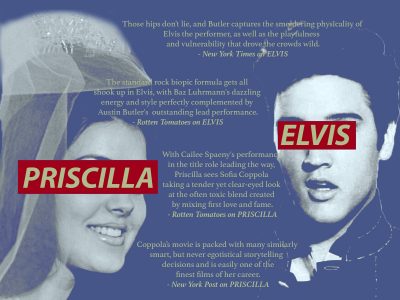Biopics can often strike box office gold, but in turn, they subject themselves to a certain level of criticism. Audiences love to see the lives of idols retold on the big screen, but they watch with already formulated opinions on the film’s subject.
Unlike original narrative fiction, the details of the subject’s life are already a matter of public adoration or scrutiny. Some films love to mollycoddle the preexisting cultural understandings of an idol, and others like to turn them on their head. Baz Luhrmann’s recent biopic, “Elvis,” was an unnecessary celebration of an already revered figure. However, Sofia Coppola’s new film “Priscilla,” an adaptation of Priscilla Presley’s memoir “Elvis and Me,” exists as an understated but scathing response to Luhrmann’s uninsightful biopic, criticizing Elvis’ status as American royalty.

“Elvis” was an attempt to cover the entire trajectory of Elvis Presley’s career, leaving little time for the film to breathe as it jumped from moment to moment. Luhrmann’s signature flashiness allows for insufferable tonal inconsistencies and an utter lack of nuance applied to each narrative conflict. The film is left with a surreal and nightmarish tinge as it attempts to cover the complexities of Elvis’s fame. It is a two-and-a-half-hour headache that falls at nearly every hurdle, hardly holding Elvis accountable for his public and personal failings and portraying him as the victim of an uncompromising industry.
In contrast, “Priscilla” is concerned with painting an interior portrait of Priscilla’s relationship with Elvis, employing Coppola’s common themes of female adolescence and self-actualization. While Luhrmann shows the tribulations of stardom and the torture of fame, Coppola uses a suffocating and intentional hollowness to illustrate a young girl’s loss of innocence. She is bathed in the rewards of fame but trapped in the banality of a man’s possession.
Priscilla’s character is barely an afterthought in Luhrmann’s “Elvis,” more of an object forming his environment than a human component of his life. She’s simply another visual stimulant and pressure thrown in along with everything else in Elvis’s tortured life. Coppola refuses to condole Elvis as a star, instead, condemning him as a man. Priscilla’s impression of Elvis takes precedence over the publics’, and instead of seeing a tortured artist, we see a manipulative man fully capable of and willing to dish out his own torment.
Coppola’s unapologetic condemnation of Elvis is in opposition to his high cultural status. While Luhrmann is concerned with an unnecessary coddling of Elvis’s image, Coppola transforms our perception of his signature traits – his charm and charisma become sinister tools for manipulation rather than objects of adoration. The shocking height difference between Elvis, Jacob Elordi, and Priscilla, Cailee Spaeny, is a visual reminder of the power he holds over her, as are the lighting choices — when she looks up at him, her face is illuminated with innocence, when he gazes down at her, his face is sinister and shadowed.
Coppola is well known for her images of lonely women trapped in beautiful surroundings, and occasionally, this aestheticization of everything can warp the viewer’s attachment to the characters in favor of the environment. But in “Priscilla,” the empty beauty and increasing mundanity of its imagery humanizes her protagonist and expertly exhibits the process of manipulation. The bright pastels of adolescence turn dull and empty as the film progresses and Priscilla’s disillusionment grows. While Luhrmann’s film is bathed in bright and flashy colors, the gold and silver of “Priscilla” tarnish into banality.
Ultimately, “Priscilla” is a calibrated response to the way “Elvis” flattens the iconic relationship between the couple. “Elvis” is nightmarish and heavy-handed and “Priscilla” is delicate and haunting, a necessary revision of our biases and a patient retaliation to Elvis’s idolized reputation. Coppola rightfully turns Priscilla’s story into more than a story of an icon – instead, it’s a story of a loss of innocence and a recognition of desire.
















































































































Jody • Oct 27, 2023 at 3:25 am
I am looking forward to seeing this film. Coppola is an excellent director.
Liberty • Oct 25, 2023 at 10:01 pm
Wth?! Leave Elvis alone! Let the man be remembered for what is fans see, a wonderful entertainer and gorgeous man! Maybe you all haven’t heard that it’s not cool to talk about the dead when they cannot defend themselves! I’ll never read anything from this hateful person again.
Judy • Oct 25, 2023 at 10:07 am
Baz is fantastic is all I can say..
Joanna • Oct 23, 2023 at 8:19 pm
Luhrmann’s “ELVIS” is a Masterpiece!
Jim Burrows • Oct 18, 2023 at 11:54 pm
Keep dreaming…